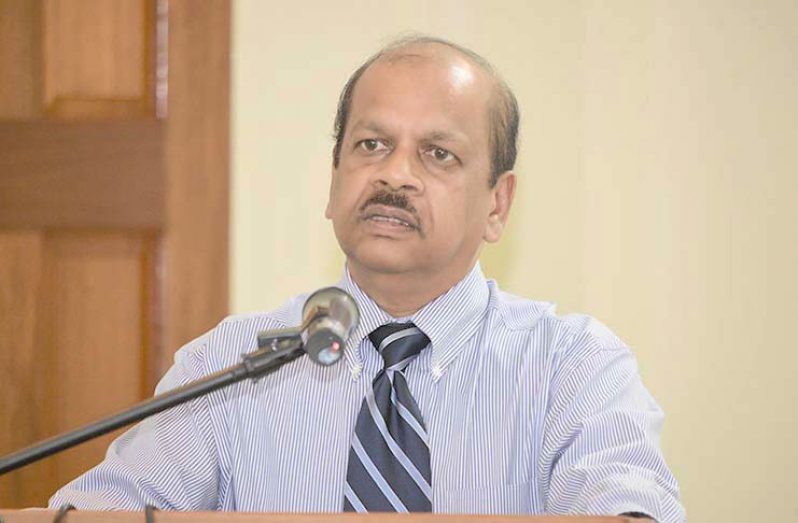—- BoG Governor encourages the Region
By Lisa Hamilton
WHILE experts in the financial service industry may rely on technical terms to explain the needs of their countries, especially during the global crisis, the average person does not care about these technical terms but about the simple assurance that policies will be put in place to meet their basic needs.
This was the position of Governor of the Bank of Guyana, Dr. Gobind Ganga during his appearance on the online edition of the Caribbean Economic Forum 2020 on June 25, 2020. In his capacity as incoming Chairman of the Regional Group of Central Bank Governors, several questions were posed to Ganga on matters affecting his country and the Region.
THE PEOPLE’S LANGUAGE
One person who tuned in asked whether countries in the Region have erred by utilising social security funds to provide relief during the pandemic through nationally declared emergencies, as opposed to the use of war-time methods of financing to provide basic incomes as subsistence allowances.
Ganga said that in times of crises, it matters little to the average man where financial support for his survival comes from, but it is the responsibility of governments to make wise decisions which benefit the vulnerable.
“When we are speaking about the livelihood of people, it doesn’t matter where we’re looking; if it is from a social security fund or some emergency fund with respect to some war time or whatever, the bottom line is that we have to look at the livelihood of people,” he said.
The governor added: “In this Region we still have a high level of poverty. When we talk about monetary, fiscal and other types of policies, that doesn’t make any sense to the poor people and the people who are vulnerable. So, we have to have certain measures in place to ensure that there is sustainable relief in terms of welfare for these people, meaning that we should have the basic social security guarantee in terms of an income to the vulnerable; to those in the informal sector that are most affected; with any situation, not just COVID. It is an ongoing thing that we have to be very, very cognisant of.”
Ganga noted that those who make up the informal sector represent almost 30 to 40 per cent and when governments observe the level of poverty that exists, they must see the need to improve the social security systems or welfare programmes in place. He said that these measures must also allow for diversification and much ensure that the vulnerable have access to decent jobs to be able to contribute to the development of their country and the Region.
COLLECTIVELY COMBATTING COVID-19
The BoG Governor also fielded questions on how the Region can work together to help limit the impact of COVID-19. In response, he pointed to CARICOM, one of the oldest customs unions in the world, as a means through which countries in the Region can collaborate.
Among other purposes, CARICOM works to remove tariffs between member states and to set up a common external tariff to non-members. Dr. Ganga reminded participants that CARICOM was set up primarily as a result of the many benefits which could come from regional integration.
“A regional approach is very, very important because it provides for a more efficient and effective way to address the challenges of COVID-19, or any of [the] problems or challenges that we may face,” the governor said.
In working together through CARICOM, Ganga said that countries will not only be able to improve their own welfare, but that of the Region also. “What we have to do is to deal with issues in a very coordinated, concretive and a wholesome manner and, by doing that, we save a lot of energy and costs,” he said
The BoG Governor pointed out that almost all International Financial Institution (IFIs) prefer to deal with the Region as a collective, as opposed to individual countries as they are aware of the benefits that come from the collective.
A SUSTAINABLE FUTURE
He also touched on the need to digitise public sector regulatory agencies for the modernisation and diversification of markets beyond the tourism sector and to make regional export markets more competitive.
Dr. Ganga said that while enhancing technology and digitising transactions are very important to improving efficiencies, governments must be cognisant of the need for training and safeguards which prevent fraud.
He stated: “We have to be very, very careful in terms of the phasing of technology not only within our systems, but also within our social context. Indeed, there is so much to be had from digitalised transactions but once again, we also have to be very careful with respect to fraud. We will find that those who have gone straight into having more digitalised payments would have encountered quite a lot of fraud. So, we have to be careful so that we have their safety in terms of cyber security. We have to have the type of capabilities to overlook employees who are part and parcel of this digitalised world.”
Speaking also on oil, which has been hit as a result of the pandemic, Dr Ganga encouraged countries in the Region to take advantage of low oil prices. Meanwhile, he said that Guyana, now as an exporting country, will be working to balance its dependence on fossil fuel with the enhancement of sustainable energy sources.
He said: “We know that fossil fuels do have a finite amount and therefore, from oil, we will try to maximis e our revenues but, at the same time, we will try to maximise our benefits from appropriate energy sources that are sustainable, that can provide positives for the environment and also in terms of the welfare improvement of the people of Guyana, the Region and the world.”












